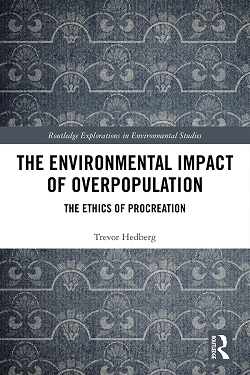Environmental Ethics and Global Population Growth
If you visit a webpage with a world population clock, you'll quickly notice two things: global human population is greater than 7.8 billion, and it is still steadily growing. Until recently, the dominant thought with respect to global population was that it would peak at about 9 billion in 2050 and stabilize or perhaps begin to decline, but recent projections from the United Nations and from other experts suggest that population stabilization may not occur this century at all. We could have a global population of greater than 11 billion by 2100 if current trends continue.
It's easy to be skeptical of concerns about population because those who predicted population catastrophes in the past, most notably Thomas Malthus and Paul Ehrlich, overestimated the impacts of population growth. Nevertheless, it is a mistake to ignore one of the variables in the IPAT Equation: environmental impact is a result of the multiplicative contribution of population, affluence, and technology. Even if we assume that technological innovation will reduce per capita ecological footprint, these reductions will not result in an overall decrease in environmental impact if population growth outpaces them.
Serious talk about population growth is often avoided, however. Discussing the issue brings to mind worries about forced abortions and mandatory sterilizations – severe infringements on reproductive freedom that are generally regarded as morally abhorrent. There is no doubt that taking population seriously requires directly addressing the conflict between promoting a sustainable population and promoting procreative liberties, and given the severity of the problems to which population growth contributes (such as climate change, biodiversity loss, and resource depletion), it's quite possible that no tidy resolution to this conflict will be forthcoming. But that's hardly an excuse to ignore the problem or act as if the carrying capacity of the Earth is infinite. Some recent contributions to academic philosophy, such as the collection Life on the Brink and Sarah Conly's One Child, indicate that philosophers are starting to share this sentiment.
 In The Environmental Impact of Overpopulation: The Ethics of Procreation (Routledge, 2020), I address the difficult moral question of what we ought to do – both collectively and as individuals – in response to rising global population.
Although I do engage with some of the traditional issues in population ethics, such as the non-identity problem, my main aim is to craft moral principles that can help us respond appropriately to our actual population
problem in light of the empirical facts about it. One of the book's guiding themes is that responding adequately to overpopulation requires a long-term focus: we must take seriously the equal moral status of those
who will not be born for centuries or even millenia. Taking the moral status of future people seriously means, among other things, that we should pursue lasting solutions to these problems rather than those that will only
prove satisfactory for the next few generations. Unfortunately, developing such a long-lasting solution to the population problem without compromising other crucial moral values is no easy task.
In The Environmental Impact of Overpopulation: The Ethics of Procreation (Routledge, 2020), I address the difficult moral question of what we ought to do – both collectively and as individuals – in response to rising global population.
Although I do engage with some of the traditional issues in population ethics, such as the non-identity problem, my main aim is to craft moral principles that can help us respond appropriately to our actual population
problem in light of the empirical facts about it. One of the book's guiding themes is that responding adequately to overpopulation requires a long-term focus: we must take seriously the equal moral status of those
who will not be born for centuries or even millenia. Taking the moral status of future people seriously means, among other things, that we should pursue lasting solutions to these problems rather than those that will only
prove satisfactory for the next few generations. Unfortunately, developing such a long-lasting solution to the population problem without compromising other crucial moral values is no easy task.
With all that in mind, I argue that there are a number of morally permissible measures that we can take to reduce global population in the long term and that doing so is a moral requirement. I also address the broader relationship between the environmental impact of people's actions and the ethics of procreation more generally. When the book was still in progress, I summarized some of the key arguments in a presentation delivered at the University of South Florida. You can view the entirety of that talk below:
I have also been involved with two Author-Meets-Critics panels pertaining to The Environmental Impact of Overpopulation. One of these was conducted with Don Hubin (Ohio State) and Ramona Ilea (Pacific University) and hosted virtually by Ohio State. The full session is viewable below:
The other panel was pre-recorded for the annual meeting for the Association for Practical and Professional Ethics in 2021. Rivka Weinberg (Scripps College) and Christine Overall (Queen's University) provide some critical remarks on some of my arguments, and I offer brief responses. The pre-recorded presentation is viewable below, although there was no way to recreate the live chat that accompanied it:
The Environmental Impact of Overpopulation has been formally endorsed by
Travis Rieder (Johns Hopkins),
Ramona Ilea (Pacific University),
John Nolt (University of Tennessee), and the late
Martin Schönfeld (University of South Florida).
The book is available in hardback, paperback, and ebook formats, and you can purchase the book at any the online venues below:
Routledge |
Amazon |
Barnes & Noble |
Waterstones
